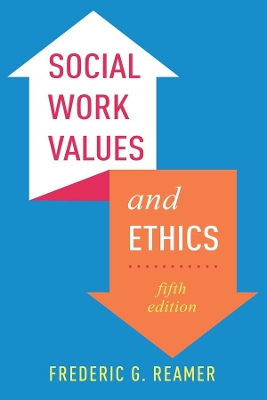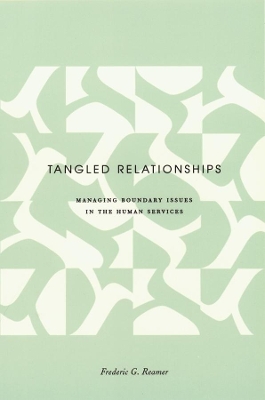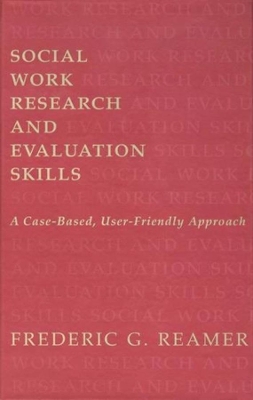Foundations of Social Work Knowledge
3 total works
For decades, teachers and practitioners have turned to Frederic G. Reamer’s Social Work Values and Ethics as the leading introduction to ethical decision making, dilemmas, and professional conduct in practice. A case-driven, concise, and comprehensive textbook for undergraduate and graduate social work programs, this book surveys the most critical issues for social work practitioners.
The fifth edition incorporates significant updates to the National Association of Social Workers Code of Ethics and new practice and model regulatory standards used by social service and licensing agencies around the world. Reamer also focuses on how social workers should navigate the digital world through discussion of the ethical issues that arise from practitioner use of online services and social networking sites to deliver services, communicate with clients, and provide information to the public, and what standards will protect confidential information transmitted electronically. He highlights potential conflicts between professional ethics and legal guidelines and expands discussions of informed consent, confidentiality and privileged communication, boundaries and dual relationships, documentation, conflicts of interest, and risk management. Conceptually rich and attuned to the complexities of ethical decision making, Social Work Values and Ethics is unique in striking the right balance among history, theory, and practical application.
The fifth edition incorporates significant updates to the National Association of Social Workers Code of Ethics and new practice and model regulatory standards used by social service and licensing agencies around the world. Reamer also focuses on how social workers should navigate the digital world through discussion of the ethical issues that arise from practitioner use of online services and social networking sites to deliver services, communicate with clients, and provide information to the public, and what standards will protect confidential information transmitted electronically. He highlights potential conflicts between professional ethics and legal guidelines and expands discussions of informed consent, confidentiality and privileged communication, boundaries and dual relationships, documentation, conflicts of interest, and risk management. Conceptually rich and attuned to the complexities of ethical decision making, Social Work Values and Ethics is unique in striking the right balance among history, theory, and practical application.
Should a therapist counsel a former lover or accept a client's gift? If so, has a boundary been crossed? Some boundary issues, like beginning a sexual relationship with a client, are obvious pitfalls to avoid, but what about more subtle issues, like hugging a client or disclosing personal information to a client? What are the boundaries of maintaining a friendship with a former client or the relative of a client? When do conflicts of interest overburden the client-practitioner relationship? Frederic Reamer, a leading authority on professional ethics, offers a definitive and up-to-date analysis of boundary issues, a rapidly emerging topic in the field of human services. One of the only works in the field to provide a conceptual framework for the dual relationship between practitioner and client, this book provides an in-depth look at the complex forms these relationships take. It also gives practical risk-management models to aid human service professionals in the prevention of problematic situations and the managing of dual relationships.
Reamer examines the ethics involving intimate and sexual relationships with clients and former clients, practitioners' self-disclosure, giving and receiving favors and gifts, bartering for services, and unavoidable and unanticipated circumstances such as social encounters and geographical proximity. Case vignettes that help illustrate important points are also included in each chapter.
Reamer examines the ethics involving intimate and sexual relationships with clients and former clients, practitioners' self-disclosure, giving and receiving favors and gifts, bartering for services, and unavoidable and unanticipated circumstances such as social encounters and geographical proximity. Case vignettes that help illustrate important points are also included in each chapter.
The role of research and evaluation in the field of social work has changed significantly since the 1970s. Practicing social workers are increasingly expected to be able to evaluate a client's progress and to research established methods for dealing with particular issues. moreover, groundbreaking research is no longer the exclusive preserve of academics or professional researchers. Practicing social workers are increasingly depended upon to develop, evaluate, and disseminate new methods and information. This text shows how research issues come about, and are resolved, in the course of daily practice. Reamer uses a single extended example of the fictional Mt. Washington Family Service Agency. The chapters draw on the many issues dealt with by the agency with extensive use of real-life examples, such as drug and alcohol abuse, depression, community organizing and reports to the board of directors.
He demonstrates how case-workers, counsellors and administrators evaluate the effectiveness of interventions, conduct needs assessments, draw on empirically-based literature and findings to inform their practice, and finally create and disseminate information for use by other professionals. Clearly written and including humorous anecdotes and cartoon drawing to engage students, this book also provides a picture of the relevance of research and evaluation to any social work practice.
He demonstrates how case-workers, counsellors and administrators evaluate the effectiveness of interventions, conduct needs assessments, draw on empirically-based literature and findings to inform their practice, and finally create and disseminate information for use by other professionals. Clearly written and including humorous anecdotes and cartoon drawing to engage students, this book also provides a picture of the relevance of research and evaluation to any social work practice.


